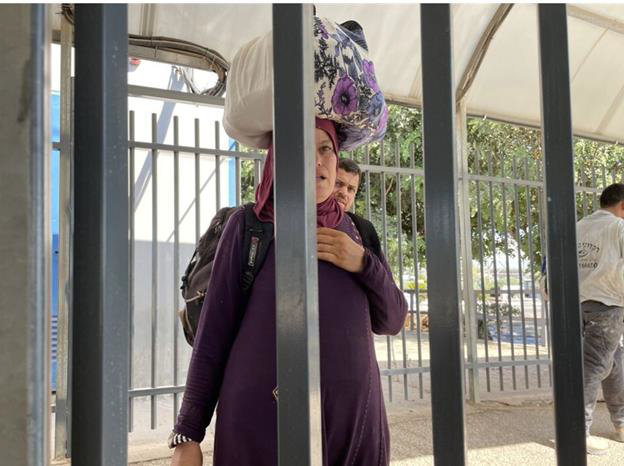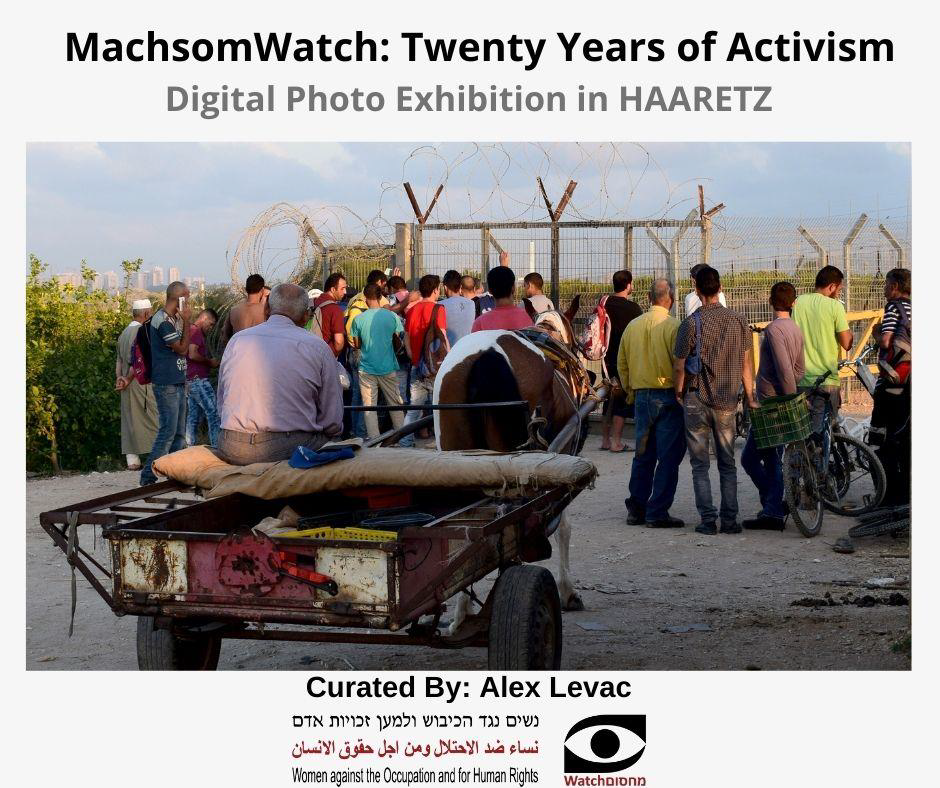About MachsomWatch
Since 2001, MachsomWatch has observed, monitored, documented, and raised awareness about conditions faced by Palestinians in the Occupied Palestinian Territories (OPT) under Israeli military rule. In 2004, MachsomWatch became an independent legal entity, registering as a non-profit company called the Women's Fund for Human Rights, Ltd.
MachsomWatch is composed of around 200 Israeli women volunteers. As an all-women grassroots organization, we reject hierarchy and work only through cooperative teamwork. The organization does not have an office, as we work from our homes and in the field. Expenses are kept to a minimum and are only used for material needs.
MachsomWatch activists dedicate extraordinary time, energy, and commitment to protecting the Occupation. We embody a democratic feminine civilian presence in military spaces. Our daily presence in front of soldiers and Palestinian civilians demonstrates that there are Israelis who oppose the Occupation. Playing the dissident role in Israeli society subjects us to challenges to our own free speech and the right to protest, even within a society that sees itself as democratic.
Challenges in 2021
During 2021, we witnessed an increase in harassment of the Palestinian population by settlers, sometimes with the backing of the military, and harassment encountered by Machsom Watch members during their shifts, mainly in the South Hebron Hills and the Jordan Valley. Our members who monitor the Northern region and other areas reported an increase in the number of breaches in the Separation Barrier, where workers passed through to get to work in Israel.
The COVID-19 pandemic still prevented many Palestinians, including those with permits, from reaching their workplaces in Israel. It also affected our operations, mainly in the central region. Although Machsom Watch members have been able to resume their activities following the vaccinations and the end of the Israeli lockdowns, meetings with Palestinians in villages in the central West Bank, and especially in local councils, have been greatly reduced.
Our Focus
Monitoring Checkpoints
Our volunteers carried out 482 checkpoint visits in 2021. Although we returned fully to monitoring the checkpoints this year, COVID-19 still affected the livelihood of many Palestinians. During 2021, we witnessed:
• Checkpoints that were closed even after the Israeli COVID-19 lockdown had ceased
• Palestinians passing through gaps in the Separation Wall, which began with the closure of the checkpoints due to COVID-19
of the checkpoints due to COVID-19
• Palestinians standing in long lines at Qalandia Checkpoint
• COVID-19 vaccinations of Palestinians at checkpoints
• Prevention of vehicles from passing through the Bethlehem checkpoint • Palestinians who were prohibited from crossing at checkpoints despite being vaccinated because a family member had COVID-19 or was in quarantine or the place of residence in the West Bank had a high rate of COVID-19 (this was not the case for vaccinated Israelis) or the permit holder was considered a danger to public health, presumably due to the coronavirus.
• Palestinians waiting at agricultural checkpoints hoping somebody would open the checkpoints for them
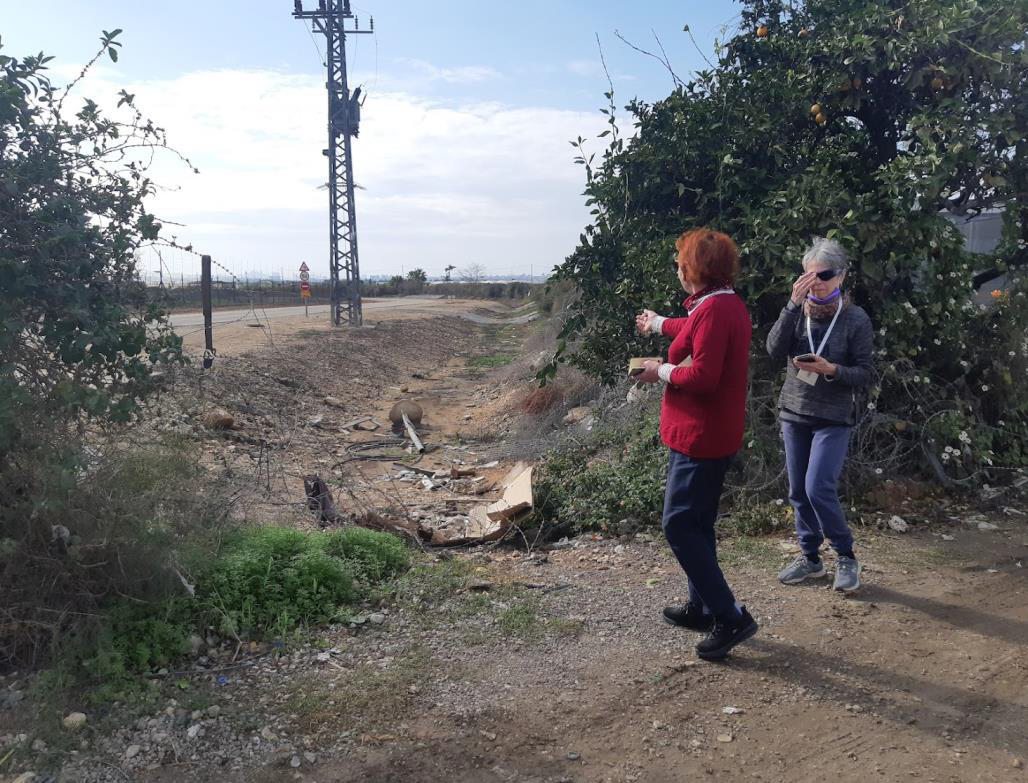
Special Focus: Greater Jerusalem
At the large checkpoints—Qalandia, Bethlehem, Shu'afat refugee camp, and the Olives—2021 included several corona lockdowns until mid-February 2021. And even after that, Palestinians who were not vaccinated with the first vaccine and later the second vaccine were prevented from entering Israel. Throughout the year, the women of MachsomWatch discovered that there was no regular coordination between the PA and the Administration regarding the information on vaccinating civilians. Again and again, we met people with vaccination certificates from two weeks ago and more, whose details were not updated on the computer in the administration or at the checkpoint itself and were sent home. We warned about this, and MachsomWatch members contacted the administration and worked privately and in general on the problems.
In mid-March 2021, Israel began vaccinating workers from the West Bank at vaccination sites at the large checkpoints, at the request of employers. The goal was clear, not to harm Israel’s economy while everything else—access to health, education, worship, community relations—is unimportant.
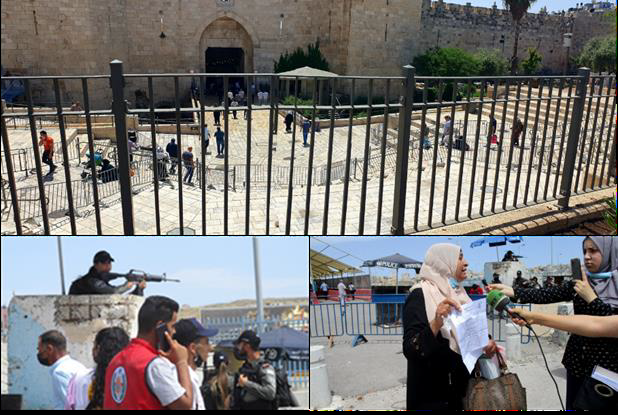
The month of Ramadan began on April 13 2021 and was particularly stormy. Every Friday, the women of Machsom Watch held vigils in the Old City and at Qalandia, Olives, and Bethlehem checkpoints. We documented the blocking of the amphitheater at the Damascus Gate and the violation of the holiday tradition of popular gathering there. We discovered that only 10,000 permits were approved for all residents of the West Bank for the Friday prayers to al-Aqsa Mosque, and because children and women were not totally vaccinated, the presence of families was low. At the Bethlehem, Olives, and Qalandia checkpoints, the number of those passing through the checkpoints to attend the prayers at al-Aqsa was only about one-tenth of those who had passed through in previous years. Ramadan was sad and violent. Israeli security forces were around every corner of the Old City, detaining many youth and using violence even on the Temple Mount. All this we have published in our reports and in our newsletter.
Qalandia checkpoint:
Every week, a special shift documented the passage of patients crossing the checkpoint and who had to transfer from Palestinian ambulances to Israeli ones in a difficult and not short procedure. In many cases, the difficulty is due to the fact that Israel prevents suitable medical equipment for cancer patients. Even babies in need of medical care are transported in this way with only one parent allowed to accompany them to a hospital in Jerusalem far from their home. The other family members cannot visit.
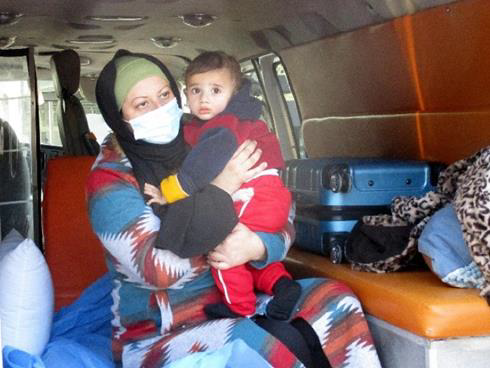
During some weeks of 2021, we documented the return of long lines to the Qalandia checkpoint due to a lack of personnel and malfunctions in the computer that controls all the electronic control at the crossing.
We documented and warned about the heavy pedestrian traffic on the huge two-story bridge leading from the check-in hall to Israel and back. A long ramp, a winding track, and difficult stairs have made the passage arduous for the elderly, the disabled, mothers with children, and more. In June 2021, the poor planning of the vehicle checkpoint claimed the life of a young Palestinian woman from Jericho, who made a mistake and entered the crossing area and was shot. The checkpoint environment underwent many changes in 2021, and we have followed them with concern while constantly reporting and being in contact with other organizations. In August, the demolition of Atarot’s old airport runway was completed, and plans were advanced for constructing a new neighborhood for religious Jews. A roundabout at the entrance to the checkpoint from Israel was demolished, and we were there with residents of Kafr ‘Aqab who were demonstrating against it. Work already began on the road for Israelis only arriving from the West Bank to bypass the Qalandia checkpoint and connect them directly to roads to Tel Aviv and Jerusalem.
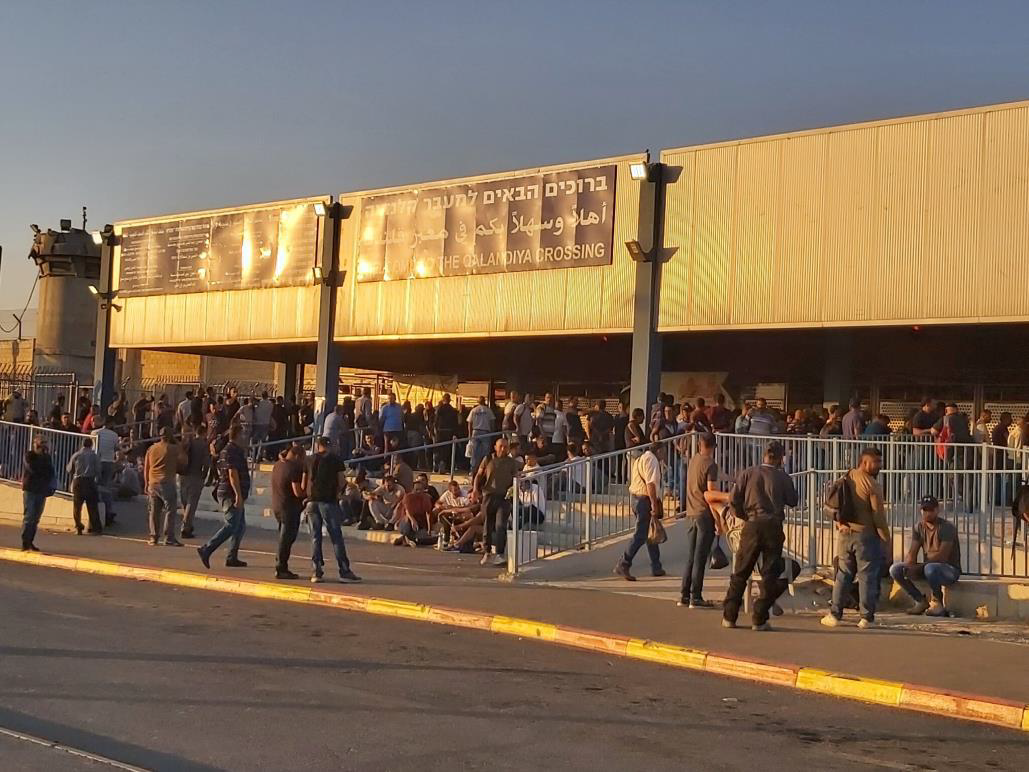
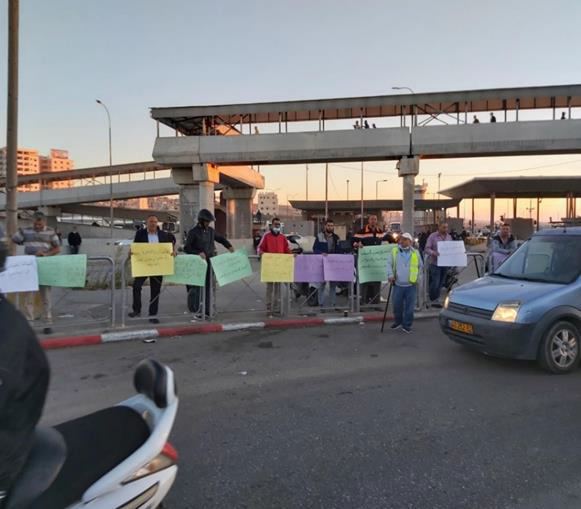
Bethlehem Checkpoint
It was only in mid-March, after weeks of roadblocks of the access road from Jerusalem, that the traffic was allowed to return. Until then, the pedestrians had to walk about a kilometer and a half from the exit of the checkpoint to Jerusalem and vice versa. Merchants were not allowed to cross the checkpoint for more than four months. We reported and protested that any special rituals or rituals at the nearby Rachel's Tomb caused delays in opening the crossing and blocked access to it from the Jerusalem side by vehicles, while buses of Jewish worshippers passed freely.
A recurring serious problem was the non-opening of the women's and humanitarian crossing even during peak hours, and women complained of the pushing and touching, which left them mentally and physically bruised. We documented the problem and complained to the Civil Administration and it helped somewhat.
and it helped somewhat.
The Olives Checkpoint
We reported several times that soldiers at the checkpoint treated with contempt the Palestinians who passed through the checkpoint. We complained about this to the Civil Administration during and after the shifts. The functioning of the checkpoint deteriorated since the DCO (Coordination and Liaison Center) was closed during Ramadan 2020. There is no one to turn to in case the facilities malfunctions.
North Jerusalem Enclaves
We toured the area comprehensively and spoke with residents of aRam, Kafr ‘Aqab (which belongs municipally to Jerusalem but is on the other side of the Separation Wall), Bir Nabala, Nabi Samwil, Givon, the Bidu enclaves, and 7 other villages. These enclaves are surrounded by the Separation Wall, and their residents who lack the blue ID cards of Jerusalem residents cannot work their remaining agricultural lands and cannot pass into Jerusalem without special permits, and even that is only through the remote Qalandia checkpoint.
There is no doubt that Jerusalem has become a “forbidden city” for the villages and towns that surround it.
In the center of Jerusalem
We visited ‘Isawiya. which is sometimes blocked by police checkpoints and the Shu'afat refugee camp checkpoint (which belongs municipally to Jerusalem but is surrounded by the Separation Wall). We also toured Silwan, Sheikh Jarrah, Abu Dis, and 8 Ras al-‘Amud. In these areas, we reported changes on the ground and roadblocks that pop up from time to time.
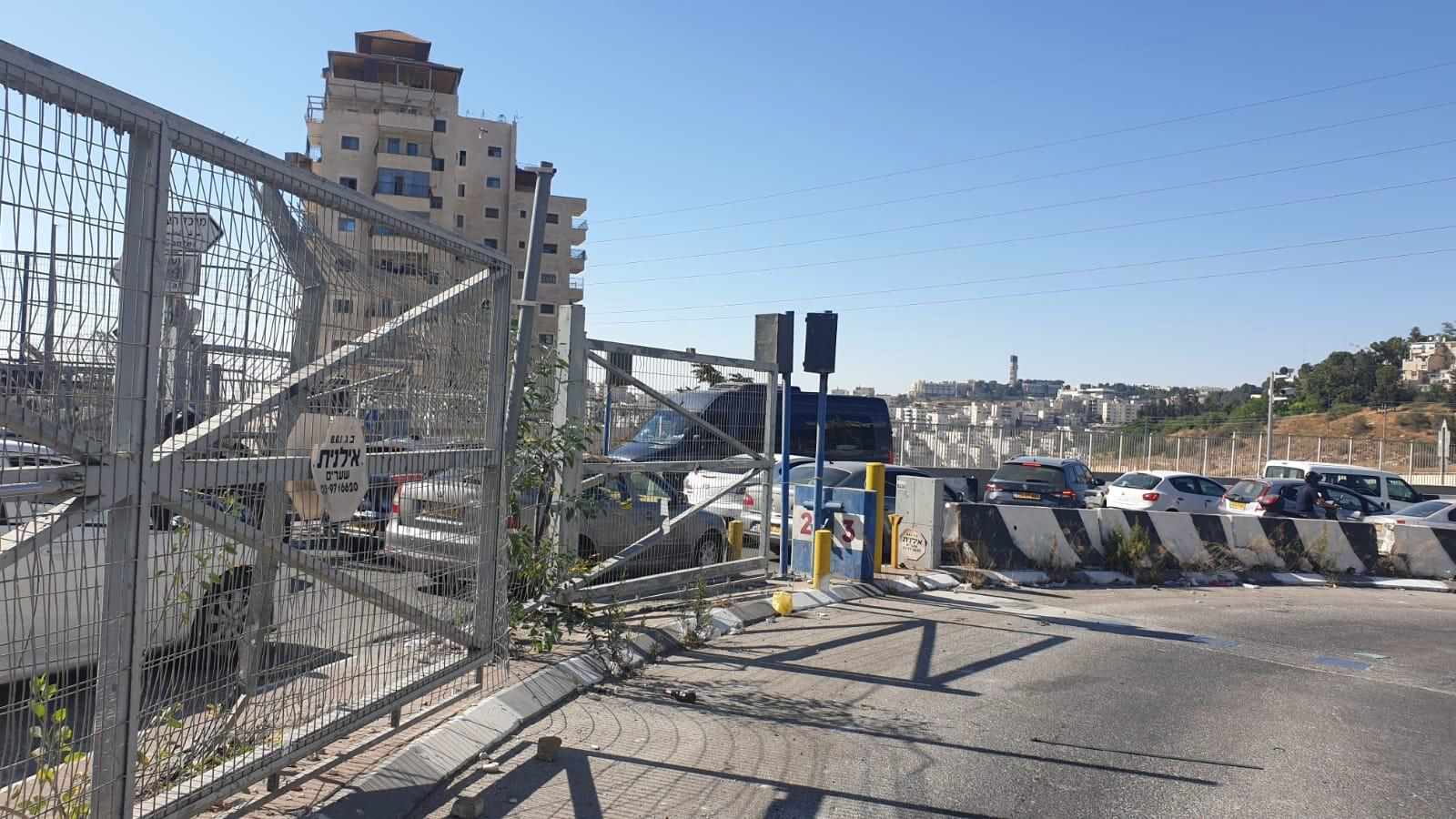
South Jerusalem and Gush Etzion
- We maintained ongoing contact with the residents of Sheikh Sa‘ad, which is cut off from the larger neighborhood of Jabel Mukaber and its services by the Separation Wall, and we received reports about crossing the checkpoint during the corona period. Fortunately, no corona lockdown was imposed on this neighborhood, by decision of the mayor of Jerusalem. We also went on tours of Route 60 and the tunnel checkpoint, the Gush Etzion area, and its checkpoints for laborers building the settlements. We also toured along the new southern American road leading from Sheikh Sa'ad to Tekoa. It is an apartheid road for those with blue ID cards.
- MachsomWatch members also visited the Maqams—Palestinian popular places of worship— which Palestinian residents of the area cannot always access, in the Gush Etzion area several times during the year, reported on new restrictions created by the expansion of the Tunnels Road with another tunnel, and on the appropriation of these holy places by the Gush settlements and its outposts. Their knowledge gives a bleak picture of a large-scale takeover of ancient places of worship and they are restricted to Jews only.
- Every week, a special shift went out to the Etzion DCO, where we talked to those waiting there, heard about special humanitarian problems, tried to help first before getting the response of the administration employees and police officers, and referred the special problems to the blacklisting team of Machsom Watch which helps deal with the bureaucracy and liaison with the Civil Administration
 .
.
Maintaining a Regular Presence in the Jordan Valley
We made 82 visits to the Jordan Valley in 2021. This year, as in past years, MachsomWatch volunteers regularly accompanied Palestinian shepherds to protect them from aggressive settlers who have attacked the shepherds as their flocks graze. Occasionally, some volunteers spent the night in the Jordan Valley. We visited different communities in the Jordan Valley, particularly those threatened with demolition. We worked together with the Jordan Valley Coalition, Combatants for Peace, and others to rehabilitate water cisterns in the northern Jordan Valley. We also brought clothing, rugs, household items, toys, and games for needy families in Hadidya and Khalat Makhoul in the northern Jordan Valley.
During the year, we witnessed
• Settler violence against the shepherds and activists
• Confiscation of animals by the settlers
• Soldiers standing idle despite settler violence
• Confiscation of Palestinian lands declared to be “nature reserves” which are in fact settler outposts
• Some quiet days of grazing
We are convinced that without our presence, the attacks on the shepherds and the confiscation of their animals could be much worse.
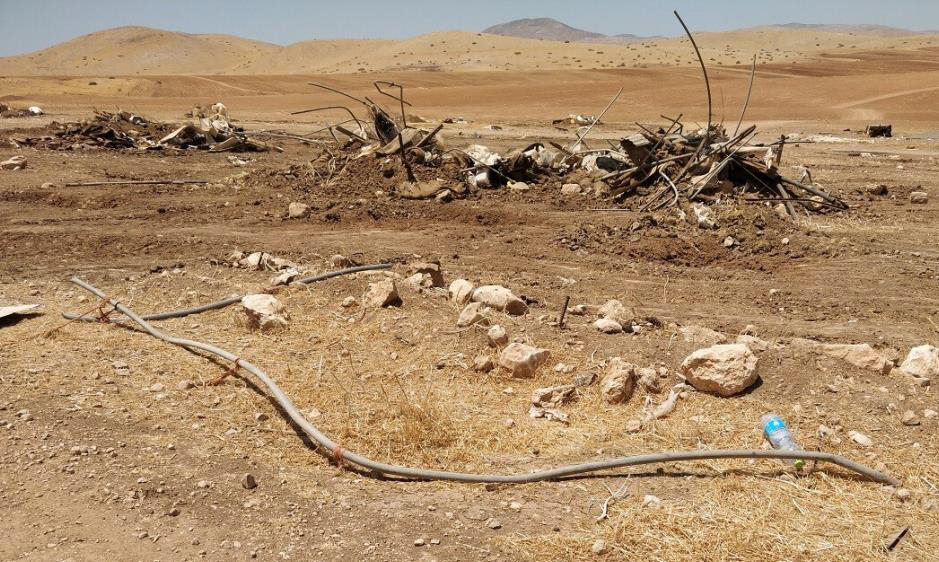
As in previous years, our volunteers regularly escorted Palestinian shepherds to the pasture to protect them from violent settlers who attack the shepherds while the herd is grazing in the field. There were even cases where the volunteers had to stay all night in the Jordan Valley. We visited different communities, especially those threatened with deportation and demolition. We were in Ein El Hilwa during Passover when the settlers converted a spring that was used by the Palestinian herds of cattle into a children's pool and we watched the herds looking for another source of water. We worked together with the Jordan Valley Coalition, "Warriors for Peace" and others to restore water cisterns in the north of the Jordan Valley. We also brought clothes, carpets, housewares, toys and games to needy families in the communities of Al-Hadidiya and Halat Mekahol in the north of the Jordan Valley.

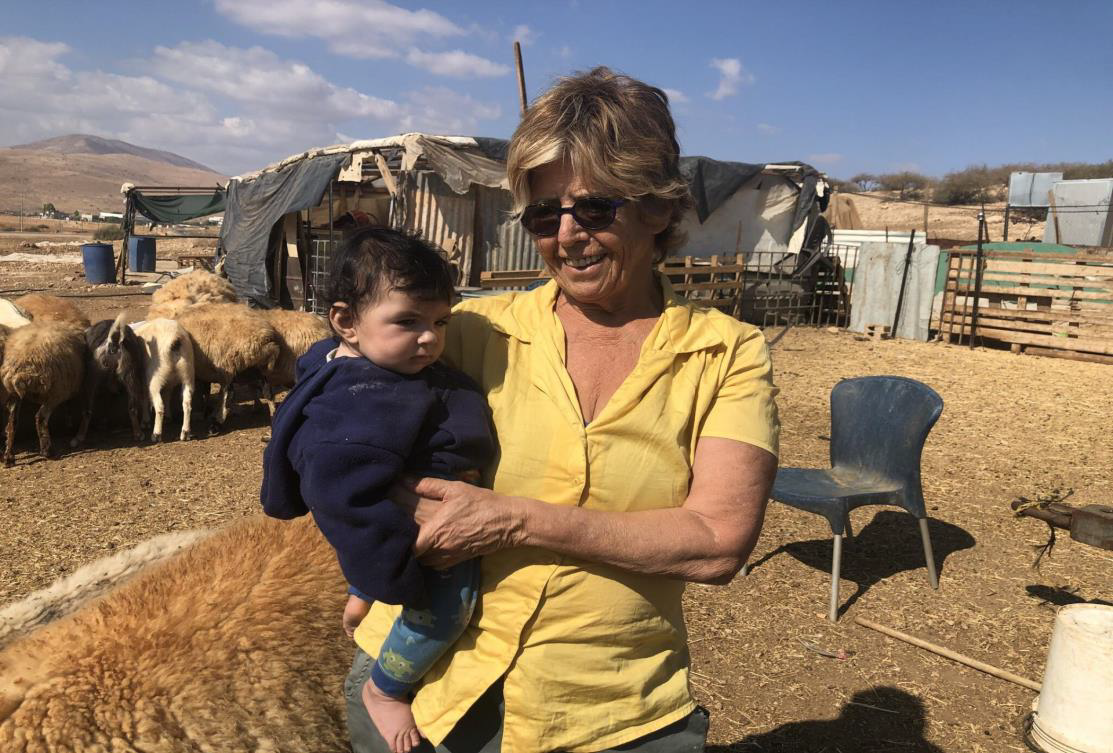
Presence in Hebron & South of Mount Hebron
In Hebron:
At the beginning of the year, the Palestinians in Hebron reported the difficult situation in the city, due to the high incidence of Corona and the lack of sufficient medical services. Later it was reported about harassment by the settlers, an attempt to take over Palestinian shops that were closed due to the plague or the theft of building boards for "Leg B'Omer" bonfires. In meetings with the Palestinians, our friends hear about the small settlements near Hebron that are suffocating the Palestinian settlement and also about the curfew imposed on the residents of 2H to allow 45 thousand Jews to come to the city during the "Life of Sarah".
In the south of Mount Hebron:
the year began with a demonstration against the demolition of houses and the agitation of the settlers and the army in Tawani and in Rakiz on January 15, during this period we participated in an initiative aimed at bringing water to a village cut-off from water. The initiative ended with the violent dispersal of the citizens by the army using tear gas and stun grenades.
Checkpoint Watch companies from different regions of the country participated in these activities.
Our reports included a visit to a village where a house and a water well were destroyed and the school received a demolition order; comforting the mourners of a man who was killed while climbing on the roof of his house; A visit to the village of Umm Fuqra where the Palestinians were attacked by settlers with clubs, axes and stones and a 4-year-old boy who was injured was hospitalized in Soroka; We reported on collective punishment by blocking the entrance to the village for a long time, due to children throwing stones. When visiting another village to sympathize with the demolition of a house, it was difficult for the participants not to feel the hateful looks.
The Maqam Project: Surveying Israel’s Takeover of Traditional Palestinian Heritage Sites
Our work on traditional Palestinian Heritage sites (maqam) continued to be of interest this year. presented a webinar (see below) about these sites that appeared in a Turkish online newspaper, Daily Sabah.
Helping Blacklisted Palestinians
Our work helping Palestinians to remove themselves from Israel’s blacklist continued, submitting on average 2,500 in 2021 despite the Covid19 pandemic. requests per year From 2015 until 2021, we have helped, of which 44% have been successful in removing themselves.
In 2021, we continued to help Palestinians fill out documents in Hebrew. Overall, our communication has increasingly moved to WhatsApp, and as a result, we now receive fewer phone calls.
In addition, people can now submit requests to be removed from the blacklist directly, using an app created by the Coordination of Government Activities in the Territories (COGAT). The app, however, only informs people when their blacklisting is successfully removed. Those who do not receive any answers turn to us and we then submit a new request. They then receive an answer that allows them to either petition the court or submits a new request the following year.
In areas that have been protesting the Occupation, Palestinians have not been able to remove themselves from the blacklists. For example, we noticed that people from Jenin, following riots there, all received negative answers as did people from the Ramallah area.
This year Palestinians were also blacklisted because they came in contact with somebody who had COVID-19, even those who had been vaccinated.
Those who are refused removal of their names from the blacklist have the right to petition the courts. We continued to work with Adv. Tamir Blank in submitting appeals to Palestinians blacklisted for security reasons. MachsomWatch volunteers collected documents, obtained signatures, and passed the information on to the advocate. As these appeals cost money, we noticed that this year that the number of petitions dropped as people either were Women or girls at Qalandiya Checkpoint Photo: Tamar Fleishman, April 23, 2021. 11o Palestinians (LEAP), a new unable to afford the cost of appeals or they turned to Legal Aid t organization. In 2021, we obtained positive outcomes in 34 appeals or 68%. From 2015 to 2021, on average, we have been successful in 69% of the appeals.
Tours and Lectures
Instead of our tours, which halted at the successful webinars , each attended by between 150 and 200 people beginning of the pandemic, we gave a number of . On February 7, 2021, in our webinar “ Innocent until Proven Guilty Not in this Court Attorney Sahar Francis, CEO of Addameer organization spoke about the military courts. She was joined by MachsomWatch member Nitza Aminov. ,” On February 14, 2021, we held an urgent w ebinar on “ Crisis in the Jordan Valley and South Hebron Hills ,” with a panel composed of H aaretz journalist Amira Hass, MachsomWatch members Daphne Banai and Rachel Afek; peace activist and Rabbanit Leah Shakdiel, and Combatants for Peace member Yair Buntzel. On July 25, 2021, we held a webinar about Israel’s takeover of Palestinian heritage and religious sites in the West Bank , based on our report of the same name, which was issued in 2020. At the end of August 2021 we held a panel discussion with Anat Saragusti, Alex Levac, Miki Kratsman, and Avital Toch about the role of photography in activism The number of people attend against the Occupation. ing our webinars was beyond expectation, usually reaching over 200 people at each webinar . The webinars emphasized MachsomWatch’s grassroots work, as well as its cooperation with other organizations. They received much praise from attendants and MachsomWat ch members alike and attested to the wish of the public to be better informed about the Occupation and various aspects of our work. These webinars also provided us with hundreds of names to add to our mailing list and also helped us to raise some funds fro donors. m private 13
As tour groups were not able to enter the country, we also gave a few lectures via ZOOM to various overseas groups, including Newcastle Friends of Palestine and a group of European friends of Nes Amim. In early September, two members of MachsomWatch spoke with PeaceCast, the Americans for Peace Now Podcast. They spoke about MachsomWatch and their reasons for being involved in the organization. Particularly during 2021, MachsomWatch worked with activists from other organizations, including Peace Now, Torat Tsedek, Combatants for Peace, to share information, engage in joint activism (especially around the Jordan Valley), and to create its webinars. We also began exploring ways of cooperation with another group, Mothers Against Violence, which emerged out of the demonstrations against Netanyahu.
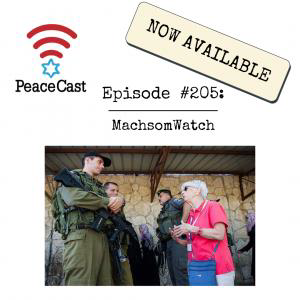
Talks with Israeli Youth about the Occupation and Human Rights
In 2021, despite the continued pandemic, we travelled all over Israel to meet with over 500 young students from 20 pre-military academies. We presented power point lectures in their classrooms, or took them on short tours of checkpoints and the West Bank. We consider listening to these young people, whose parents were already born into the Occupation and sharing with them our views on Human Rights and our knowledge of the situation in the West Bank, one of our most important tasks.
Media Outreach, Website, and Facebook
We were mentioned in at least 25 media items in the Israeli and foreign press in 2021, in addition to 6 academic books published in English. Compared to previous pre-Covid years, our press coverage has decreased slightly, primarily due to the restrictions placed on entering Israel. During this period, our name was used as a kind of brand. In one article about BDS and Ben and Jerry’s ice cream, our name appeared, even though we had nothing to do with the subject. We also appeared as part of a heading in an article about an art exhibit, which has no connection to MachsomWatch.
At the end of August, to commemorate 20 years of activism, MachsomWatch launched its digital photography exhibit on Haaretz’s website, acknowledging our contribution to observing, documenting, and exposing the Occupation. The exhibit was curated by acclaimed photographer and Israel Prize laureate Alex Lebac, with accompanying texts taken from our reports. The exhibit remains available online permanently and appears in both English and Hebrew. An estimated 6,000 people have already viewed the exhibit.
Our Facebook page in Hebrew reached 129,623 people, up by 80.5% from the previous year. Paid posts reached 5,000 to 10,000 people at a time. Overall, 8,169 people visited our page, this is a 33.5% increase. In 2021, we received a total of 371 new Facebook likes. By the end of 2021, we had 7,575 followers on Facebook, slowly but steadily increasing since 2019. 68% of our followers are from Israel.
We also continue to promote our work and awareness about the Occupation via Twitter. At the end of 2021, we had 1,954 followers, an increase of 130 followers since the previous year. Our work on Twitter is rather a low key, however, as Israelis tend to be on Facebook. We also revamped our website in 2021. During this time, we had a total of 57,886 visitors to the site, most of whom were new users. While all ages visited our site, over 20% were aged 25 to 34 and 81% of our visitors were from Israel! We also published 4 newsletters in Hebrew and English, which we shared with over 3,000 subscribers.
אנו מודות לכם על תמיכתכם :
הקרן החדשה לישראל
SBSCT
Women’s World Day of Prayer
, Germany SIVMO
תורמים פרטיים רבים

